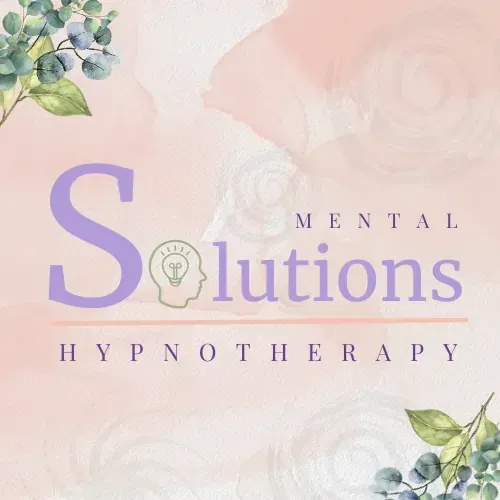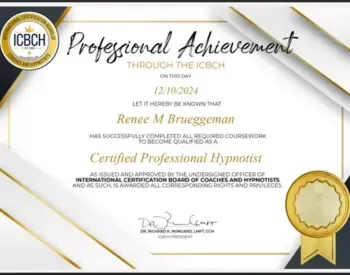
Welcome!
I'm Renee Brueggeman
I help professional women address emotional eating by identifying and reframing the underlying emotional triggers. Through compassionate and focused hypnosis, we explore the subconscious mind to replace limiting beliefs and unhealthy patterns with positive, empowering suggestions, fostering both self-love and emotional balance. This process empowers you to develop a healthier relationship with food, build self-awareness, and embrace emotional well-being without the need to use food as a coping mechanism.
We'll work together on Zoom, allowing you to relax in the comfort of your own space.
Welcome!
I'm Renee Brueggeman

I help professional women address emotional eating by identifying and reframing the underlying emotional triggers. Through compassionate and focused hypnosis, we explore the subconscious mind to replace limiting beliefs and unhealthy patterns with positive, empowering suggestions, fostering both self-love and emotional balance. This process empowers you to develop a healthier relationship with food, build self-awareness, and embrace emotional well-being without the need to use food as a coping mechanism.
We'll work together on Zoom, allowing you to relax in the comfort of your own space.

Weight Loss
Hypnosis
Hypnosis isn’t just about losing weight—it’s about healing your relationship with food and your body. By addressing the root causes of emotional eating, negative self-image, and dieting patterns, hypnosis helps you develop a healthy, sustainable approach to weight loss that lasts.

Emotional Breakthroughs
Breathwork
Breathwork is a range of techniques that focus on consciously controlling the breath to improve physical, mental, and emotional well-being. By using specific breathing patterns, breathwork can help release tension, calm the mind, and promote relaxation. These techniques are often used to enhance mental clarity, reduce stress, increase energy, and support emotional healing.

Stress Reduction
Hypnosis
Hypnosis helps reduce stress by inducing deep relaxation, calming the body and mind, while also shifting negative thought patterns and enhancing emotional resilience. It can reframe stressful situations, improve coping mechanisms, and promote better sleep. By accessing the subconscious, hypnosis empowers individuals to manage stress more effectively and build long-term resilience.

Anxiety & Worry
Hypnosis
Hypnosis can effectively relieve both stress and anxiety. By inducing deep relaxation, it helps reduce the physical symptoms of stress, such as muscle tension and rapid heart rate. Additionally, hypnosis can address the underlying thought patterns contributing to anxiety, reframe negative perceptions, and teach relaxation techniques, ultimately promoting a calmer and more balanced emotional state.
How Effective Is Hypnosis?
American Health Magazine Compared Different
Types Of Therapy And Found:

Psychoanalysis
38% Recovery after
600 Sessions

Behavior Therapy
72% Recovery after
22 Sessions

Hypnotherapy
93% Recovery after
6 Sessions
Hypnosis
Mental Solutions Services

Reduce Stress
Stress is the basic cause of 60% of all human illness and disease and can increase the risk of heart disease, heart attacks, and strokes.

Weight Loss Hypnosis
Hypnosis for weight management re-educates your unconscious mind – the part that creates cravings and impulses – to give you back real control over what you eat.

Breathwork
Breathwork helps to manage emotions and reduce stress, complementing the benefits of hypnosis.
What others are saying about Renee Brueggeman
Request A Consult Call
Transform
Your
Life Today!
Free Consultation
(815) 567-9138
Online Video Sessions
Transform
Your
Life Today!
Free Consultation
(815) 567-9138
Online Video Sessions
Hypnosis FAQ's
1. What is Hypnosis?
Hypnosis is a therapeutic approach that uses hypnosis to induce a relaxed state of focused attention, allowing the hypnotist to access the subconscious mind and address various issues.
2. How does Hypnosis work?
During a hypnosis session, the hypnotist guides the individual into a trance-like state, where the subconscious mind becomes more receptive to positive suggestions. This allows for exploration and resolution of underlying issues.
3. Is Hypnosis the same as being asleep?
No, hypnosis is not sleep. While individuals may appear to be in a deep state of relaxation, they are fully aware and can respond to suggestions. It's a heightened state of focused attention.
4. Can anyone be hypnotized?
Most people can be hypnotized, but the level of responsiveness varies. Individuals who are open to the process, willing to participate, and trust the hypnotist tend to experience more profound results.
5. Is Hypnosis safe?
Hypnosis can be used to address a wide range of issues, including smoking cessation, weight management, stress reduction, anxiety, phobias, pain management, sleep disorders, and personal development.
6. What can hypnosis help with?
Hypnosis can be used to address a wide range of issues, including smoking cessation, weight management, stress reduction, anxiety, phobias, pain management, sleep disorders, and personal development.



